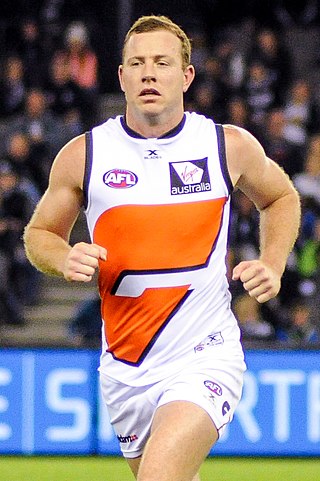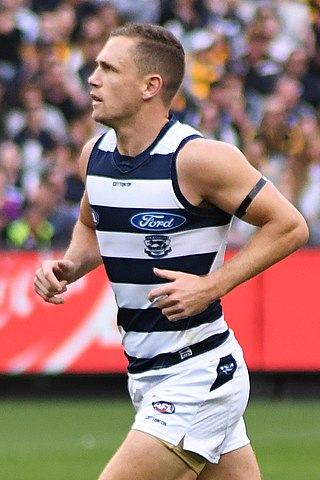Related Research Articles

Gary Robert Ablett is a former professional Australian rules footballer who represented Hawthorn and Geelong in the Australian Football League (AFL). Nicknamed "God", Ablett is widely regarded as one of Australian football's greatest players, and was especially renowned for his high-flying spectacular marks and his prolific goalkicking.
Douglas Graeme Wade is a former Australian rules footballer who played for the Geelong Football Club and North Melbourne Football Club in the Victorian Football League (VFL).

Steven Leigh Johnson is a former professional Australian rules footballer who played for the Geelong Football Club and the Greater Western Sydney Giants in the Australian Football League (AFL). He was selected by Geelong with pick 24 in the 2001 AFL Draft. His first few years were plagued with inconsistency, injury and off-field problems. A medium-sized forward, Johnson is renowned for his freakish ability on the field, where he has consistently wowed fans with his penchant for extraordinary goals.
The 1989 VFL season was the 93rd season of the Victorian Football League (VFL), the highest level senior Australian rules football competition and administrative body in Victoria and, by reason of it featuring clubs from New South Wales, Queensland and Western Australia, the de facto highest level senior competition in Australia. It was the last season under the Victorian Football League name, before being renamed the Australian Football League in 1990. The season featured fourteen clubs, ran from 31 March until 30 September, and comprised a 22-game home-and-away season followed by a finals series featuring the top five clubs.
The 1962 VFL season was the 66th season of the Victorian Football League (VFL), the highest level senior Australian rules football competition in Victoria. The season featured twelve clubs, ran from 21 April until 29 September, and comprised an 18-game home-and-away season followed by a finals series featuring the top four clubs.
The 1967 VFL season was the 71st season of the Victorian Football League (VFL), the highest level senior Australian rules football competition in Victoria. The season featured twelve clubs, ran from 15 April until 23 September, and comprised an 18-game home-and-away season followed by a finals series featuring the top four clubs.
The 1980 VFL season was the 84th season of the Victorian Football League (VFL), the highest level senior Australian rules football competition in Victoria. The season featured twelve clubs, ran from 29 March until 27 September, and comprised a 22-game home-and-away season followed by a finals series featuring the top five clubs.
The 1972 VFL season was the 76th season of the Victorian Football League (VFL), the highest level senior Australian rules football competition in Victoria. The season featured twelve clubs, ran from 1 April until 7 October, and comprised a 22-game home-and-away season followed by a finals series featuring the top five clubs – an increase from the four clubs which had contested the finals in previous years.
The 1973 VFL season was the 77th season of the Victorian Football League (VFL), the highest level senior Australian rules football competition in Victoria. The season featured twelve clubs, ran from 7 April until 29 September, and comprised a 22-game home-and-away season followed by a finals series featuring the top five clubs.
The 1974 VFL season was the 78th season of the Victorian Football League (VFL), the highest level senior Australian rules football competition in Victoria. The season featured twelve clubs, ran from 6 April until 28 September, and comprised a 22-game home-and-away season followed by a finals series featuring the top five clubs.

Joel Anthony Selwood is a former Australian rules footballer who played for the Geelong Football Club in the Australian Football League (AFL). He is a quadruple premiership player, a six-time All-Australian, and a three-time captain of the All-Australian team. Selwood captained Geelong between 2012 and 2022, is the club's games record holder, has won the Carji Greeves Medal three times as their best and fairest player, and holds the record for longest-serving captain in the AFL.
Terry Bright is a former Australian rules footballer who played for Geelong in the VFL.
The 1967 VFL Grand Final was an Australian rules football game contested between the Richmond Football Club and Geelong Football Club at the Melbourne Cricket Ground on 23 September 1967. It was the 70th annual grand final of the Victorian Football League, staged to determine the premiers for the 1967 VFL season. The match, attended by 109,396 spectators, was won by Richmond by a margin of nine points, marking the club's sixth VFL premiership and their first since 1943.
The 1974 VFL Grand Final was an Australian rules football game contested between the Richmond Football Club and North Melbourne Football Club, held at the Melbourne Cricket Ground in Melbourne on 28 September 1974. It was the 77th annual grand final of the Victorian Football League, staged to determine the premiers for the 1974 VFL season. The match, attended 113,839 spectators, was won by Richmond by a margin of 41 points, marking that club's ninth VFL/AFL premiership victory. The game itself is also notable for being the first grand final to be videotaped and telecast in colour.
The 1931 VFL Grand Final was an Australian rules football game contested between the Geelong Football Club and Richmond Football Club, held at the Melbourne Cricket Ground in Melbourne on 10 October 1931. It was the 33rd annual Grand Final of the Victorian Football League, staged to determine the premiers for the 1931 VFL season. The match, attended by 60,712 spectators, was won by Geelong by a margin of 20 points, making it the club's second VFL premiership victory. The triumph has become legendary because it was the first, and only, season that Geelong was coached by Charlie Clymo.
The history of the Geelong Football Club, began in 1859 in the city of Geelong, Australia, is significant as the club is the second oldest AFL club, is believed to be the fourth oldest football club in Australia and one of the oldest in the world and one of the most successful. Initially playing under its own rules, some of which, notably, were permanently introduced into Australian Football. It adopted the Laws of Australian Football in the early 1860s after a series of compromises with the Melbourne Football Club.

Callum Moore is a professional Australian rules footballer who played in the Australian Football League (AFL), including eight matches over a four-year tenure with Richmond and two matches over one season with Carlton. While at Richmond in 2019, he won a VFL premiership while playing reserves grade football.

Tyson Stengle is a professional Australian rules footballer who plays for the Geelong Cats in the Australian Football League (AFL). Stengle played junior representative football with Woodville-West Torrens in the SANFL and represented South Australia at national championships at under 18 level. He was drafted by the Richmond Tigers in the 2017 rookie draft, made his AFL debut in round 15, 2017 and was traded to the Adelaide Crows in the 2018 trade period. He was delisted by Adelaide prior to the 2021 AFL season, but proceeded to join the Geelong Cats in 2022, winning the premiership with them that year. Stengle lives with Eddie Betts in Melbourne.
Sam Simpson is a professional Australian rules footballer who last played for the Geelong Football Club in the Australian Football League (AFL). The son of former Geelong player, Sean Simpson, he was drafted by Geelong with their fourth selection and fifty-third overall in the 2017 rookie draft under the father–son rule. He made his debut in the draw against Greater Western Sydney at Spotless Stadium in round fifteen of the 2017 season.
The 2023 Geelong Football Club season was the club's 159th season playing Australian rules football, with the club competing in their 124th season in the Australian Football League (AFL). Geelong also fielded a women's team in the 2023 AFL Women's season, and men's and women's reserves team in the Victorian Football League (VFL) and the VFL Women's (VFLW) respectively.
References
- ↑ Holmesby, Russell; Main, Jim (2002). The Encyclopedia of AFL Footballers: every AFL/VFL player since 1897 (4th ed.). Melbourne, Victoria: Crown Content. p. 31. ISBN 1-74095-001-1 .